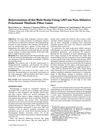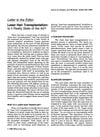26 citations,
January 2012 in “JEADV. Journal of the European Academy of Dermatology and Venereology/Journal of the European Academy of Dermatology and Venereology” The ESLD recommends international safety guidelines and standards for home-use light-based hair removal devices.
 26 citations,
April 1999 in “Dermatologic Clinics”
26 citations,
April 1999 in “Dermatologic Clinics” The long-pulsed alexandrite laser is effective for hair reduction, particularly for light-skinned individuals with dark hair, but caution is needed for darker skin.
 24 citations,
May 2017 in “Journal of Cosmetic and Laser Therapy”
24 citations,
May 2017 in “Journal of Cosmetic and Laser Therapy” The laser scanner device was more effective at increasing hair density than the laser hat in treating androgenic alopecia.
 22 citations,
September 2014 in “Veterinary Dermatology”
22 citations,
September 2014 in “Veterinary Dermatology” Low-level laser therapy seems to help dogs with noninflammatory alopecia grow hair back.
 22 citations,
June 2002 in “Seminars in cutaneous medicine and surgery”
22 citations,
June 2002 in “Seminars in cutaneous medicine and surgery” Laser hair removal works well for people with dark hair and light skin, but it's less effective for light hair or dark skin; improvements are expected.
21 citations,
April 2019 in “Journal of cosmetic and laser therapy” Laser hair removal is popular for long-term hair reduction but carries risks, requiring well-trained operators and better regulations, especially in South Africa.
 20 citations,
April 2011 in “Dermatologic Surgery”
20 citations,
April 2011 in “Dermatologic Surgery” Laser therapy helped new hair grow in scarred skin for three patients.
 20 citations,
April 1999 in “British journal of plastic surgery”
20 citations,
April 1999 in “British journal of plastic surgery” Ruby laser hair removal significantly reduces hair density.
 19 citations,
August 2007 in “Seminars in Plastic Surgery”
19 citations,
August 2007 in “Seminars in Plastic Surgery” Newer skin resurfacing lasers reduce damage and scarring, with some approved for safe use and minimal side effects.
 17 citations,
January 2021 in “Dermatology and Therapy”
17 citations,
January 2021 in “Dermatology and Therapy” Laser-assisted drug delivery has shown improved treatment outcomes for skin conditions and has potential to reduce side effects and treatment time.
17 citations,
October 2017 in “Journal of cosmetic and laser therapy” Laser hair removal is effective and safe for reducing facial hair in women with PCOS and improves their psychological well-being.
16 citations,
April 2020 in “Dermatology practical & conceptual” Laser treatment can effectively reduce unwanted hair growth, particularly for people with fair skin and dark hair.
 16 citations,
November 2016 in “Journal of Cosmetic and Laser Therapy”
16 citations,
November 2016 in “Journal of Cosmetic and Laser Therapy” Laser and light therapies, especially the 308 nm excimer laser, are effective and safe for treating alopecia areata, but more research is needed.
16 citations,
December 2015 in “Journal of Investigative Dermatology” Alopecia areata involves persistent gene abnormalities and immune activity, even in regrown hair, suggesting a risk of relapse.
 15 citations,
February 2018 in “Journal of Cosmetic and Laser Therapy”
15 citations,
February 2018 in “Journal of Cosmetic and Laser Therapy” Laser-assisted drug delivery improves hair loss.
 15 citations,
May 2017 in “Lasers in Medical Science”
15 citations,
May 2017 in “Lasers in Medical Science” Low-level laser treatment helps mice grow hair by increasing certain protein levels linked to hair growth.
 15 citations,
January 2017 in “Lasers in Surgery and Medicine”
15 citations,
January 2017 in “Lasers in Surgery and Medicine” Laser treatment improved scalp skin condition with no side effects.
 15 citations,
May 2015 in “Photomedicine and Laser Surgery”
15 citations,
May 2015 in “Photomedicine and Laser Surgery” Low-Level Laser Therapy may help with flap survival and burn scar healing, but not with venous ulcers or hair loss, and more research is needed.
 15 citations,
January 2003 in “Lasers in Surgery and Medicine”
15 citations,
January 2003 in “Lasers in Surgery and Medicine” Cold air and a chilled sapphire window both protect the skin during laser treatments, and work better with water or gel, especially for darker skin.
 15 citations,
January 1996 in “Lasers in Surgery and Medicine”
15 citations,
January 1996 in “Lasers in Surgery and Medicine” Lasers in hair transplantation may have potential but require caution due to possible damage and reduced graft survival.
 14 citations,
March 2012 in “Lasers in Surgery and Medicine”
14 citations,
March 2012 in “Lasers in Surgery and Medicine” A low-power, fast laser safely reduces hair with minimal pain and few side effects.
 14 citations,
May 2011 in “Facial Plastic Surgery Clinics of North America”
14 citations,
May 2011 in “Facial Plastic Surgery Clinics of North America” Laser hair removal is effective for dark hair but needs improvement for nonpigmented or fine hairs.
14 citations,
November 2009 in “Dermatologic Surgery” Laser hair removal can cause severe allergic reactions.
14 citations,
May 2006 in “Clinical obstetrics and gynecology” Laser hair removal shows promising short-term results but isn't yet permanent.
14 citations,
February 2003 in “Journal of the American Academy of Dermatology” Folliculotropic mycosis fungoides can affect the central nervous system in advanced stages.
 13 citations,
January 2014 in “Journal of Investigative Dermatology”
13 citations,
January 2014 in “Journal of Investigative Dermatology” The laser comb did not improve hair regrowth in mice with alopecia areata.
 13 citations,
October 2011 in “Clinical and Experimental Dermatology”
13 citations,
October 2011 in “Clinical and Experimental Dermatology” Laser hair-comb therapy doesn't improve male-pattern hair loss.
 11 citations,
January 2020 in “Skin appendage disorders”
11 citations,
January 2020 in “Skin appendage disorders” Low-level laser therapy safely and effectively improves hair growth and coverage for male and female pattern hair loss.
11 citations,
January 2014 in “Mass spectrometry” Silver oxide nanoparticles help detect small molecules effectively.
11 citations,
March 2012 in “Journal of the American Academy of Dermatology” Most patients with dark skin were satisfied with laser hair removal and had few complications.



















